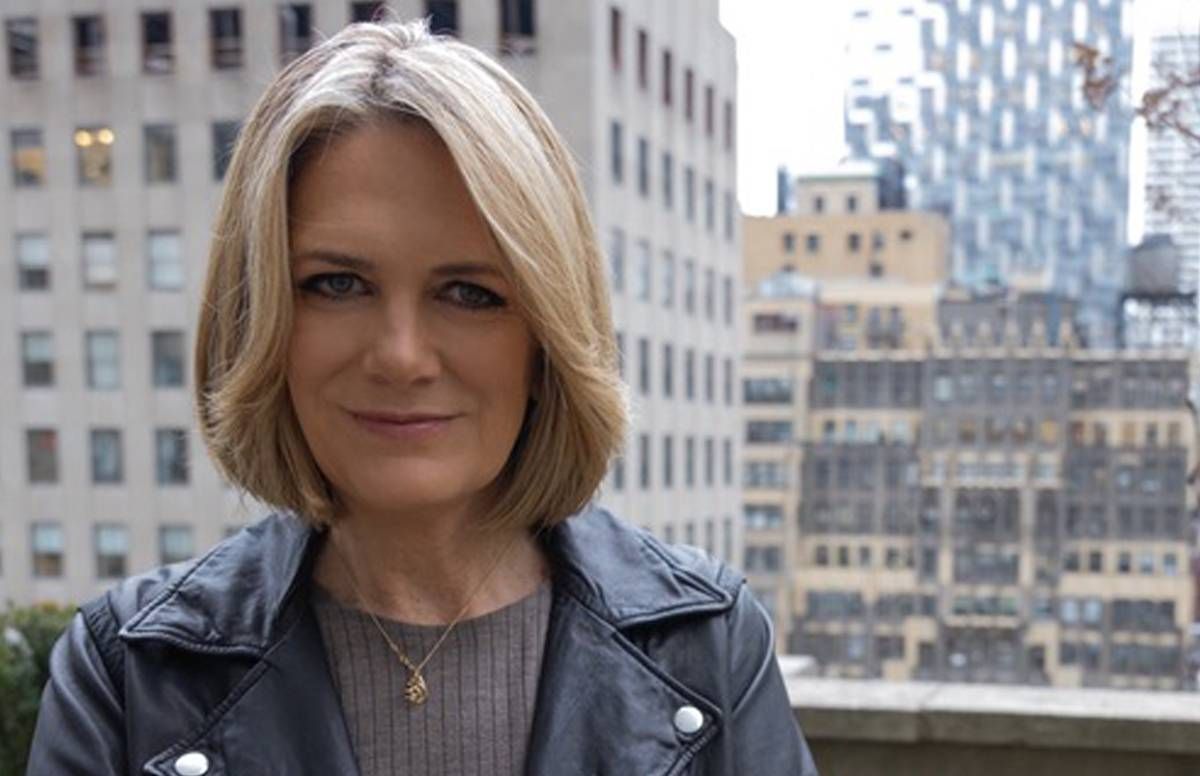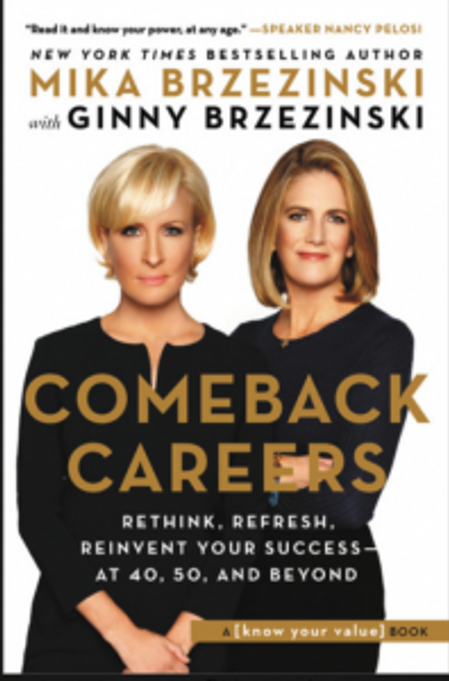Comeback Career Advice for Women Over 50
A chat with Ginny Brzezinski, co-author of a new book on the subject
Mika Brzezinski, co-host of MSNBC’s Morning Joe, has written books inspiring women to take control of their career and fight the forces holding them back in the workplace. She launched a “Know Your Value” conference series and a slick website sponsored by NBC posting articles on the topic. But she realized she wasn’t confronting the complete picture until her sister-in-law, Ginny Brzezinski, texted her one day: “Hey Mika — Can KYV address women like me who have downshifted to take care of kids and now want to pivot careers or return to work? We have value too!”

That got her attention. The result: The new book, Comeback Careers: Rethink, Refresh, Reinvent Your Success — at 40, 50 and Beyond, co-written with Ginny Brzezinski, who’s in her 50s and had been a Capitol Hill public relations pro and press secretary for 13 years before quitting to raise her kids and then become a part-time Realtor.
Getting Back in the Game in Her 50s
As Ginny Brzezinski’s children were on the verge of heading to college, she wanted to get back in the game. Problem was, she had no idea where to begin. Hence her note.
"I don’t think there is anything that they are doing wrong. It is what they are not doing and not believing in themselves."
After reading Comeback Careers — a topic I often make speeches about and write about for Next Avenue, The New York Times and in my books — I interviewed Ginny Brzezinski to learn more about the authors’ findings and get her advice for women in their 50s and 60s.
In the book, Mika Brzezinski writes: “It’s not just the stay-at-home moms and downshifters who need a hand with a career reboot.” And, she says she asked herself, “How could I help them feel fierce?”
I think the book’s can-do advice will be helpful for women hoping for comeback careers. But I have one caveat: It doesn’t get into the awful scenario I hear frequently from women in their 50s and 60s. They tell me they left their jobs to raise kids and now find themselves alone and adrift now that the kids are launched and their husbands are gone, either due to a death or divorce. Some have told me leaving the workforce was the biggest mistake they ever made.
A Conversation With Ginny Brzezinski
Here are highlights from my conversation with Ginny Brzezinski:

Kerry Hannon: Why comeback careers for women and not for men?
Ginny Brzezinski: There are a lot of men out there who are wondering the same thing. It is for women because Mika’s Know Your Value movement and series of books is all geared toward women.
The plus side is often it's a woman over fifty who is going to get hired before a man over fifty because the company is trying to make sure they have gender diversity.
Is this about more than taking time out to raise kids?
That’s where it all started: how to return to work after a career break. But the more we talked to women about this, the more it became a couple of different buckets.
There are the women who have taken time off to raise kids or to care for loved ones who want to return and aren’t sure how. There are women who were fired at around fifty, and women who hit that age and say ‘I have been doing the same thing for the past twenty years and I now am looking for something different.’
So it’s the re-launchers, the re-booters and the re-inventers.
What do women do wrong when they want to have a comeback career?
I hate to talk about things people do wrong.
But one of them is the inner journey, and that is about the narrative that goes on in your head. For a lot of women that narrative says, ‘I am rusty’ or ‘I haven’t been doing anything. Who would want to hire me?’ Maybe part of it is, ‘I am too old to do something different or to learn a new skill.’
The other is the external journey, which is the upskilling and the networking and being able to tell your career story. For women, it can be a confidence issue.
What I have found with all of the women I talked to is that confidence is gained when they start to upskill and go back and catch up with whatever industry they were in and start to talk to people and to network. I don’t think there is anything that they are doing wrong. It is what they are not doing and not believing in themselves. That tends to be the biggest hitch.
We do a lot of this confidence building for our kids, for our families, for our friends and we forget to do it for ourselves — to believe in what we can do and where we can add value.
It takes some time. You need to go through what you have been doing, whether it is volunteering or if you’ve been involved in community work, and find the transferable skills you offer. Turn that into how you can add value, in addition to your past paid experiences, to an organization or a company. Or perhaps it is starting your own business as a consultant or a solopreneur.
"You need to look at these opportunities as bridges or stepping stones, rather than the thing you are going to be doing for the next twenty years."
What's the most important thing women can do to improve their odds of success having a comeback career?
You need to start talking to people, to get your networks going.
Sometimes your networks are right in front of you. Sometimes the conversations that you have as a parent on the soccer field can become strategic conversations. Instead of talking about how your child is doing in school or sports, instead ask somebody what they do. Then you can say. ‘I am looking to get into X industry, this what I used to do, these are my skills.’ They may say, ‘My cousin works in this and I can connect you.’
If you’re on LinkedIn, reach out to former colleagues and let them know you’re looking.
So many times, you let the perfect be the enemy of the good. You are looking for a very specific goal or path and you don’t see that there are many different paths to reaching that goal, so you overlook possibilities.
You might overlook a pro bono project that would not pay you money, but it might improve your network and it’s something you can put on your resumé. Or just taking a job that is less than you had hoped for, but may be a way to get your skills back in gear and expose you to people who can help you get to the next step.
You need to look at these opportunities as bridges or stepping stones, rather than the thing you are going to be doing for the next twenty years.
Chances are, the first job back is a bridge, and you will have to be realistic and take less money or a lesser title than you hoped for if you have been out of the workforce for a while.
What should women in their fifties and sixties do to fend off age discrimination by employers if they want a comeback career?
As we all know, age discrimination is illegal and it is hard to prove, but it is out there. Employers biggest fears are that you’re not current or you are unwilling to learn new things or you will not mix well with Gen Z employees.
There are things you can do to allay those fears, like taking free classes on LinkedIn to get your tech skills up-to-date. Make sure you know the new office basics whether it is Basecamp [project management software] or simply how to do a PowerPoint presentation or work with Microsoft Excel [electronic spreadsheets]. Make sure you know some of the lingo of social media, too.
Also, you need to be comfortable mixing with other generations.
Studies have shown that multigenerational teams do some of the best work because they have different perspectives, and everybody brings a different value to the team. You need to show that you are OK working with somebody who is your boss who might be twenty or thirty years younger.
Then, it sounds superficial, but your look has to be current — that matters when you go into an interview.
Tell me about your Comeback Careers networking group of women like you.
This is something someone who is looking to reinvent, pivot or relaunch should do. I got together a group of friends — working, nonworking, stay-at-home moms, the whole mix — and asked people to bring a friend along. It started as a simple cocktail party, then everyone sat in a circle and went around and told their career story and what their hopes were for the next phase of their career, whether they were home with kids and relaunching into something or how being a parent had impacted their career.
Those of us who had known each other didn’t know half of these things about each other because our conversations had constantly centered around our kids. This evening was meant to be two hours and turned into four. It ended up becoming a network where everyone was trying to help someone else with clients, with jobs.
The network part of it is so important. You just never know what doors can open for you.
So, what's your status of getting a comeback career?
Right now, I have a number of speaking engagements lined up talking about the lessons of the book, what companies can do and what women can do to relaunch or reinvent careers at midlife and beyond. I am also working with individuals on how to tell their career stories better on LinkedIn. And I have my eyes open and following my own advice from the book on finding work in public affairs and PR in the D.C. area.
Any parting thoughts?
The workplace, and how we work, has been changed so much by technology. On the one hand, that is intimidating. But there are so many opportunities opened by these changes, and so many different ways of working. It’s an exciting time, and we have to flip it on its head from being scary to having a world of opportunities opened before us from ages fifty to eighty.


